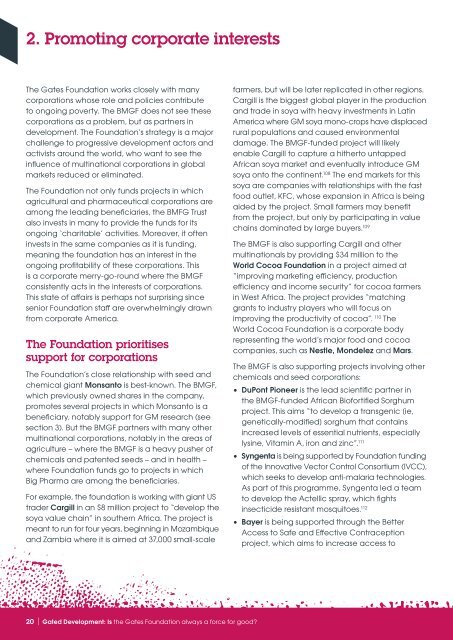Gated Development
gated_development_final_version
gated_development_final_version
You also want an ePaper? Increase the reach of your titles
YUMPU automatically turns print PDFs into web optimized ePapers that Google loves.
2. Promoting corporate interests<br />
The Gates Foundation works closely with many<br />
corporations whose role and policies contribute<br />
to ongoing poverty. The BMGF does not see these<br />
corporations as a problem, but as partners in<br />
development. The Foundation’s strategy is a major<br />
challenge to progressive development actors and<br />
activists around the world, who want to see the<br />
influence of multinational corporations in global<br />
markets reduced or eliminated.<br />
The Foundation not only funds projects in which<br />
agricultural and pharmaceutical corporations are<br />
among the leading beneficiaries, the BMFG Trust<br />
also invests in many to provide the funds for its<br />
ongoing ‘charitable’ activities. Moreover, it often<br />
invests in the same companies as it is funding,<br />
meaning the foundation has an interest in the<br />
ongoing profitability of these corporations. This<br />
is a corporate merry-go-round where the BMGF<br />
consistently acts in the interests of corporations.<br />
This state of affairs is perhaps not surprising since<br />
senior Foundation staff are overwhelmingly drawn<br />
from corporate America.<br />
The Foundation prioritises<br />
support for corporations<br />
The Foundation’s close relationship with seed and<br />
chemical giant Monsanto is best-known. The BMGF,<br />
which previously owned shares in the company,<br />
promotes several projects in which Monsanto is a<br />
beneficiary, notably support for GM research (see<br />
section 3). But the BMGF partners with many other<br />
multinational corporations, notably in the areas of<br />
agriculture – where the BMGF is a heavy pusher of<br />
chemicals and patented seeds – and in health –<br />
where Foundation funds go to projects in which<br />
Big Pharma are among the beneficiaries.<br />
For example, the foundation is working with giant US<br />
trader Cargill in an $8 million project to “develop the<br />
soya value chain” in southern Africa. The project is<br />
meant to run for four years, beginning in Mozambique<br />
and Zambia where it is aimed at 37,000 small-scale<br />
farmers, but will be later replicated in other regions.<br />
Cargill is the biggest global player in the production<br />
and trade in soya with heavy investments in Latin<br />
America where GM soya mono-crops have displaced<br />
rural populations and caused environmental<br />
damage. The BMGF-funded project will likely<br />
enable Cargill to capture a hitherto untapped<br />
African soya market and eventually introduce GM<br />
soya onto the continent. 108 The end markets for this<br />
soya are companies with relationships with the fast<br />
food outlet, KFC, whose expansion in Africa is being<br />
aided by the project. Small farmers may benefit<br />
from the project, but only by participating in value<br />
chains dominated by large buyers. 109<br />
The BMGF is also supporting Cargill and other<br />
multinationals by providing $34 million to the<br />
World Cocoa Foundation in a project aimed at<br />
“improving marketing efficiency, production<br />
efficiency and income security” for cocoa farmers<br />
in West Africa. The project provides “matching<br />
grants to industry players who will focus on<br />
improving the productivity of cocoa”. 110 The<br />
World Cocoa Foundation is a corporate body<br />
representing the world’s major food and cocoa<br />
companies, such as Nestle, Mondelez and Mars.<br />
The BMGF is also supporting projects involving other<br />
chemicals and seed corporations:<br />
••<br />
DuPont Pioneer is the lead scientific partner in<br />
the BMGF-funded African Biofortified Sorghum<br />
project. This aims “to develop a transgenic [ie,<br />
genetically-modified] sorghum that contains<br />
increased levels of essential nutrients, especially<br />
lysine, Vitamin A, iron and zinc”. 111<br />
••<br />
Syngenta is being supported by Foundation funding<br />
of the Innovative Vector Control Consortium (IVCC),<br />
which seeks to develop anti-malaria technologies.<br />
As part of this programme, Syngenta led a team<br />
to develop the Actellic spray, which fights<br />
insecticide resistant mosquitoes. 112<br />
••<br />
Bayer is being supported through the Better<br />
Access to Safe and Effective Contraception<br />
project, which aims to increase access to<br />
20 I <strong>Gated</strong> <strong>Development</strong>: Is the Gates Foundation always a force for good?


